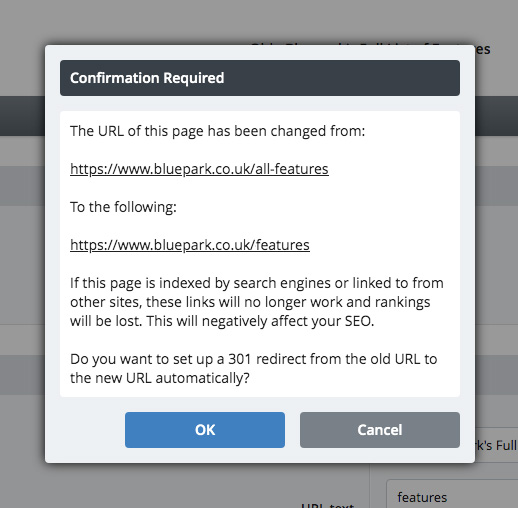 What is a 301 redirect?When you change a page's URL on your online shop, you run the risk of causing damage to your site's SEO. If the URL being changed is already indexed by Google, changing the URL will result in a 404 (Not Found) error next time Google visits the page. Even though the page still exists, Google doesn't know where it is and will consider it to have been removed. The page's ranking in the search listings (and any link authority it had) will be gone. Link authority can be defined as the quantity and quality of incoming links to a page from external sites, along with the relevance of those links to the page content. Needless to say, it takes a long time to build link authority and a simple URL change to wipe it out entirely! Along with the SEO impact, there is also the loss of traffic from potential customers clicking on the old link and being served with a 404 error page. Does this mean that you should never change any of the URLs throughout your site? No, not at all, there is a very simple solution. A 301 redirect is, technically, a specially formatted line of code which is placed in the site's .htaccess file, a special file which runs on the server every time a page is requested. Creating 301 redirects automaticallyIt has always been possible for you to add 301 redirects to a Bluepark site at the bottom of General/Settings > Settings > Website tab by adding the old URL into the From (URL) field, adding the new URL into the To (URL) field and saving. This will create the redirect code in the .htaccess file above. Now, however, whenever you change the URL text of a page, a blog category or post, a product, or a category a pop-up will prompt you to create the redirect.
If you accept the recommendation, the redirect will be added to your .htaccess file automatically. You can see that it has been added by viewing General/Settings > Settings > Website tab > Redirects for .htaccess field, where you can make further additions or modifications as necessary. If you've only just created the page, there is no need to worry about adding a 301 redirect because Google won't yet be aware of it. You only need to do this if the page has already been indexed by search engines, or if the link has been published in some way and is already in use. Please note: this feature only appears on live sites. This is because trial and development sites aren't live on the internet, so the URLs are unknown outside of the site. Recommended Reads Setting Up 301 Redirects The Correct Way Doing 301 redirects the wrong way can have a catastrophic effect on your SEO. Our guide explains how to do them the correct way to ensure you protect your current ranking. Try Bluepark for FREE for 14 daysFull access to everything including our support team, no card details required |
|
|



